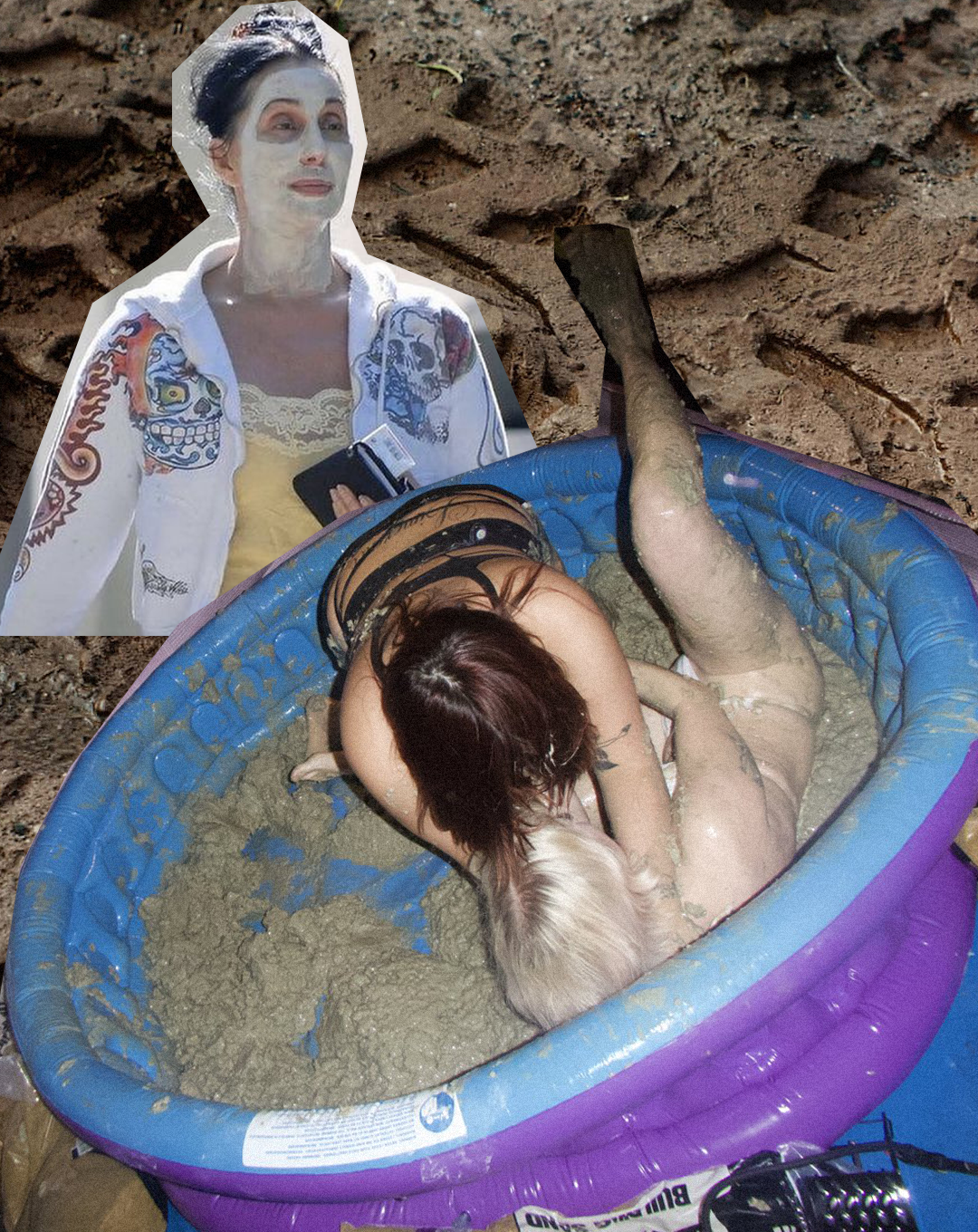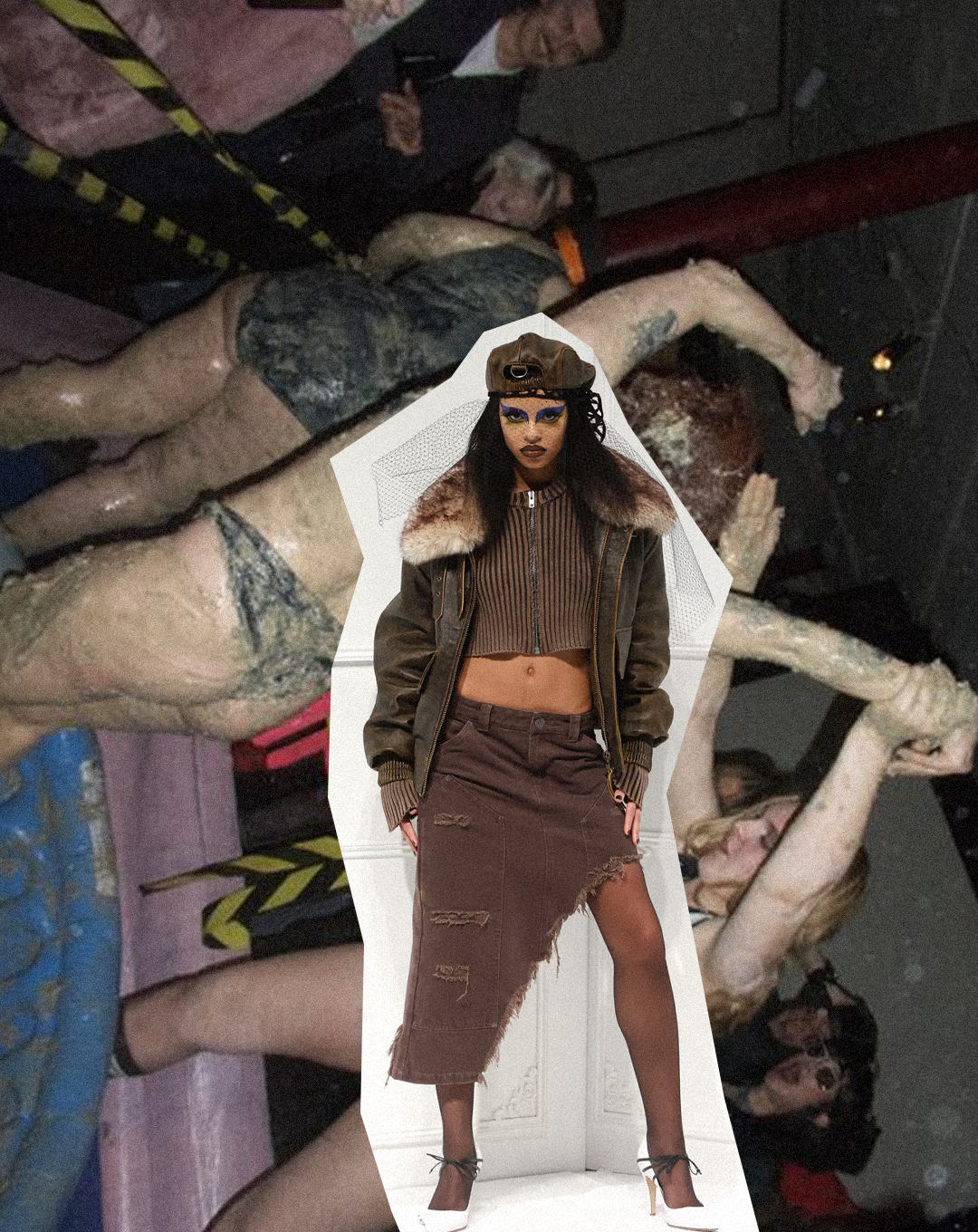Mud and the City: Finding Empowerment Through Filth
Words: Gabrielle Sicam
Make it stand out
The inceptive night of Miss Bill’s Bikini Kill, a night of feminist mud wrestling, comes into its own by the second fight. The crowd, a mix of friendly, fiendish sapphics and gallerist types in expensive outerwear, swell their volume to a holler. Domina, a revelatory band providing musical accompaniment alongside Bruno and the Outrageous Methods of Presentation, conjure a sinister, Moog-infused sonic cloud.
The fighters emerge, remove their hot pink robes - names embossed in cursive across the back - and step bikini-clad into a paddling pool’s worth of mud. For a moment, they slip against the hazard tape. Then, the pin-drop: the referee counts down, the synths crescendo, the girls find their footing. I’m reminded of the Yardbirds brawl from Blow-Up (1966), studded with riot grrrl teeth.
“I needed this,” says someone next to me. I hear variations of the phrase throughout the night from different aching mouths. The winner props herself up out of the pool, approaches the crowd, and, in a moment of elated solidarity, interlaces her fingers with mine, slathering them in the bentonite clay. My hands are rusted for the rest of the night and much of the next morning.
Covering yourself in dirt has been around forever. Its most immediate forms to us in the recent past are commercial, whether ironically sanitised (baths, face masks, and the like) or sexualised (girls in bikinis wrestling, for men). On a base level, it is quite literally a form of survivalist concealment in the wild. But what drew so many to get themselves dirty on a Thursday evening in Bloomsbury? What do people need from mud? I think it boils down to an emergent desire to point out and play within the lines of conventional sociality. Turning to dirt, affiliating oneself with mess and grime, becomes an emancipatory practice – a radical celebration of visual debasement.
The event reminded me of the 1996 documentary Dirty Girls, shot on VHS by then-high school student Michael Lucid. The film profiles a group of Los Angeles eighth-graders outcast in a wealthy school and their subsequent exploration of grunge and DIY aesthetics. It is widely assumed across their peer group that they don’t shower. It feels prescient of the “dirty girl” aesthetic and the previously upheld indie sleaze, yet there seems to be more to explore in regards to the documentary’s stars artistic affect and what the connotations of dirt have the power to conjure when seriously considered. That is, taken beyond its most immediate signifiers, in conjunction with its concrete stakes as a form of radical expression in an increasingly visio-political world.
“Turning to dirt, affiliating oneself with mess and grime, becomes an emancipatory practice – a radical celebration of visual debasement.”
I think back to the mud wrestling night, to the paddling pool. Between fights, the team mix in more clay into the pool with sheepish grins, a firm reminder that this is about getting on your knees and really being down in the dirt. There is something mimetic to the practice, a recreation of muddy childhood, a nostalgic look back to scabbed knees and jumping in puddles.
Yet equally there seems to be something forward-looking to it. Being in the mud, having to create the dirt itself, is an act that doubly performs acknowledgement of scarcity, decay, collapse. To be a girl in a bikini in mud, playing a reification of girlhood, a term already nostalgic in nature, already performing youth culture in its fragments, on its last legs. It’s aligning yourself with a culture of joy and free expression in danger of extinction. It’s acting out in the wake of an eco-political apocalypse, creating something new in the dearth of the government’s cultural pushback. There are different ways of acting out but this alignment with dirt, mud, grime is material. In the face of incoming suppression, we turn to making real our frustrations.
Still, much of this happens in the city, where it is inevitably upended by interactions with ‘tastemaking’ circles, in more ‘elite’ spaces. It is in these circles where subversion becomes more illusory, working with mechanics already approved by those higher-up. Urbanisation also means that dirt becomes more than simply what grows in the ground; even mud can be artificially created. Dirt becomes mess, the accumulation of materials, trinkets, lesions. AW24 runways have displayed interest in intentional distress, frays, meshes, swallowing silhouettes. Dirt becomes something that can be constructed, emulated (thereby making its constructions constructible) and sold.
The intrusion of capitalism means that the semiotics of dirt – initially rooted in the radical – must be negotiated within its theatre. And in the especially referential world of visual culture, sincerity becomes difficult to pinpoint. I think back to Umberto Eco’s comments on camp in his essay On Ugliness: “Not measured by the beauty of something but on the extent of its artifice and stylisation”. In London, a city of contradictions, it’s hard to say whether sincerity exists in our aesthetic vocabulary. Where dirt can be performed, it can just as easily be washed away. Can we really be messy if we’re privatising everything? It all seems worlds away from gutter punk. Self-reference bleeds; the hierarchy of virtues differentiating clean and messy is falling apart in real time.
Miss Bill seems to have tapped into a different, singular key. While still an event that plays with pastiche, paying homage to mud-wrestling as an ‘80s nightlife spectacle, it seems clear that what really drives Bikini Kill is its riot grrrl principles and its recognition of a gap in the culture for an authentic mode of creative expression. Real dirt is always going to come out of the margins.
“Eat shit! Filth are my politics! Filth is my life!” exclaims Divine as Babs Johnson, scatological icon, in John Waters’ Pink Flamingos (1972). Perhaps we all need a reminder that truly transgressive art is made from real lives.
The next night of Miss Bill’s Mud Wrestling, presented by Far From, is set for July 6th.


